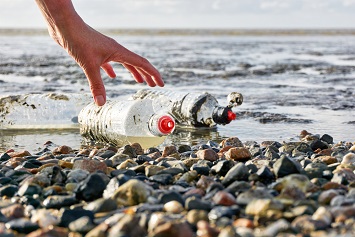On October 19, 2020, EPA Administrator Andrew Wheeler released the U.S. Federal Strategy for Addressing the Global Issues of Marine Litter at an event at Florida Atlantic University in Boca Raton, Florida. Several federal agencies, including the EPA, the Department of Energy (DOE), the White House Council on Environmental Quality (CEQ), the U.S. Agency for International Development (USAID), and the National Oceanic and Atmospheric Administration (NOAA), will work together to implement the new strategy.
“Internationally, up to 28 billion pounds of waste makes it into our oceans every year, harming marine life and coastal economies,” Wheeler said. “Marine litter is a top priority for this Administration, and working together with our global partners, we aim to solve the current growing marine litter problem in our shared oceans.”
Five Asian countries (China, Indonesia, the Philippines, Thailand, and Vietnam) are responsible for half the plastic waste that enters global oceans, according to the EPA, with most of the waste coming from waste mismanagement and littering.
The federal government has identified four key areas in the newly announced strategy:
- Building capacity
- Incentivizing the global recycling market
- Promoting research and development
- Promoting marine litter removal
Also identified within the strategy were existing programs, including the EPA’s Trash Free Waters program.
To date, through the Trash Free Waters program, the EPA currently has 50 partnership projects across the country with states, businesses, and municipalities. The program works to clean up trash already in waterways, reduce litter, and prevent new trash from entering waterways.
“This year, EPA awarded over $7.8 million to 17 recipients within the Gulf States for innovative projects focused on reducing the amount of litter in our waterways through waste prevention and/or removal,” according to the EPA. The Agency will also “award an additional $2.1 million through the Great Lakes Restoration Initiative Trash Free Waters Grant Program….”
The Trump administration’s fiscal year 2021 (FY21) and FY22 budgets include $7 million earmarked “to address marine litter domestically and internationally through a multiple year budget proposal.” “The funding would allow EPA to expand the international Trash Free Waters program to large source countries … located in southeast Asia. The funding would also allow the expansion of the domestic trash free waters program.…” according to the EPA.
To date, NOAA’s Marine Debris Program has resulted in removing more than “22,000 metric tons of marine debris from U.S. waters, engaged with more than 65,000 students on marine debris prevention activities, developed 12 marine debris response guides and 11 regional action plans,” and provided $24 million in funding for the removal and prevention of and research initiatives to address marine debris.
The DOE’s waste program is the “Plastic Innovation Challenge,” which has the goal of accelerating “innovations that will dramatically reduce plastic waste in oceans and landfills and will position the U.S. as a global leader in advanced plastics collection and recycling technologies and in the manufacture of new plastics that are recyclable by design,” according to the EPA. “Building from a foundation of prior investment and capabilities, DOE expanded their efforts in degradation, recycling and upcycling of plastics.”
The most heavily funded program is USAID’s $48 million global program Clean Cities, Blue Ocean. This 5-year program “works in rapidly urbanizing countries across Asia and Latin America to target marine plastics directly at their source. It works to improve systems that manage solid waste, build capacity and commitment to the ‘3Rs’ (reduce, reuse, recycle) and promote sustainable social and behavior change,” according to the EPA.
The American Chemistry Council (ACC) responded positively to the EPA’s announcement that it will implement the Save Our Seas (SOS) Act.
“ACC and our members are deeply committed to ending plastic waste in the environment. We actively support the bipartisan Save Our Seas (SOS) Act (versions 1.0 and 2.0), as well as the RECOVER Act, the RECYCLE Act, and the PLASTICS Act, which seeks to reduce ocean plastics by encouraging innovative, market-based solutions and catalyzing private capital to enable the development of integrated waste management systems and strengthen markets for recycling materials,” said Joshua Baca, vice president of the ACC’s Plastics Division.
Learn more about the full strategy addressing global marine litter.

